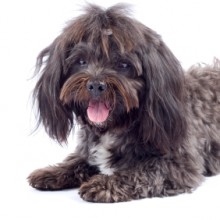Havanese
Lifestyle Needs

The Havanese is a Toy dog who is suitable as a companion or family dog. He will adapt to most home environments, including a city appartment. He is typically a lively, affectionate and intelligent breed. Like all dogs the Havanese will need regular exercise. He has a long, soft and slightly wavy coat which ideally should be groomed every day to keep it clean and tangle free. Trimming his coat, especially around his face is needed.
Genetic Diversity
(Known as Coefficient of Inbreeding: 'COI'. It should be as low as possible.)
The UK Kennel Club breed average COI is 2.7% - See 'A Beginners Guide to COI'
Gene Pool Size
(Known as Effective Population Size: 'EPS')
TBC
EPS is a measure of how many individuals are contributing genetically to a breed population. It is a measure of the size of the gene pool in a breed. Lower than 100 is considered critical by conservationists and below 50 brings a breed close to extinction. For more information see the Kennel Club article.
Health and Welfare Problems due to Conformation
(Body shape and physical characteristics)
The Havanese’s abundant hair could impact on his quality of life, especially if not trimmed around the face. It could also cause him to overheat in hot weather.
BVA/KC Health Schemes: www.bva.co.uk/chs
- Eye disease: Progressive retinal atrophy (PRA) (annual testing); Retinal dysplasia; litter screening also recommended
- Hip dysplasia: breed 5 year mean score 11.1 (parents should be lower)
Estimated Breeding Values (EBVs) : No EBVs are currently available for this breed
www.thekennelclub.org.uk/about-ebvs
DNA Tests Available
DogWellNet and IPFD Harmonisation of Genetic Testing for Dogs (HGTD)
www.dogwellnet.com/breeds
- Chondrodystrophy (Type 1 IVDD)
Availability of a DNA test does not mean that it is always necessary or even desirable for breeders to use this test.
Other Breed-Specific Health Screening Schemes
Patella test
Ask the breeder to show you the certificates for the above tests/screening for both parents. If any of the above tests have not been considered necessary by the breeder (and there may be good reasons), ask her to explain why.
Other Diseases Reported
(For which there are currently no genetic or screening tests for sire or dam)
- Abnormal dentition
- Patellar luxation
- Sebaceous adenitis
- Osteochondrodysplasia
- Distichiasis
Ask the breeder about the medical history of the parents, grandparents and great grandparents. Consider carefully whether to purchase a puppy if some of these or other diseases are in the family line.
Ask about the breeder’s policy in cases of serious genetic diseases occurring to your puppy in later life. Good breeders will request to be informed of such events in order to improve future breeding decisions.
You are strongly advised to buy from a breeder who uses (or is prepared to use) the AWF Puppy Contract and Puppy Information Pack (PIP): www.puppycontract.org.uk
The breeder should also be familiar with the CFSG/DBRG Code of Practice for Dog Breeding